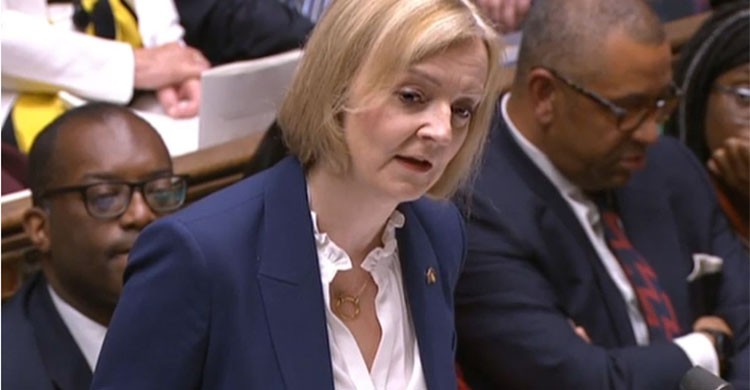UK PM on brink as political chaos deepens
20 October 2022, 06:28 pm | Updated: 24 February 2025, 02:06 am

Embattled British Prime Minister Liz Truss on Thursday faced more calls from her own party to step down after a key minister quit and lawmakers rebelled during "a day of extraordinary mayhem".
Truss is being urged to resign just six weeks into office after a forced U-turn on disastrous tax cuts that caused a market meltdown during an already severe cost-of-living crisis, reports AFP.
Right-wing broadsheet The Times reported the prime minister was "clinging to power", and cited a Truss supporter in her cabinet as saying: "It's terminal."
Its tabloid sister paper The Sun ran the front page headline "Broken", saying Truss's "authority is in tatters after a day of extraordinary mayhem".
Conservative peer Ed Vaizey said the "only way out of this mess is for Liz Truss to stand down and for somebody to be appointed as prime minister by Conservative MPs."
The party could avoid a lengthy leadership contest by consolidating around a single replacement, but Truss has shown no sign of being willing to resign.
If she resigned this would lead to a Tory leadership contest that could be shortened if Tory MPs could agree on a single replacement. Otherwise the MPs could unite to trigger a no-confidence vote.
- 'Must leave' -
The fresh calls came a day after Truss's interior minister Suella Braverman left following just six weeks in office, ostensibly for sending an official document in a personal email but using her resignation message to attack Truss.
Her sacking was the second reshuffle this month after Truss sacked close ally Kwasi Kwarteng over the tax cut debacle, replacing him with Jeremy Hunt, who swiftly reversed almost all the policy announcements.
The Daily Telegraph reported that Braverman left after a "heated face-to-face row" with Truss and Hunt "over their demands to soften her stance on immigration".
Truss appointed Grant Shapps to replace Braverman though had previously fired him as transport secretary when she took office. He had supported her rival for the leadership, Rishi Sunak.
Braverman, seen as a hardliner on immigration, said she had resigned over a "technical infringement" of government rules.
"I have made a mistake; I accept responsibility; I resign," she wrote in her resignation letter, while adding she had "serious concerns" that Truss was breaking manifesto promises.
Truss has faced widespread criticism for failing to step down herself, after forcing Kwarteng to take the blame for the botched budget of September 23, which sent markets into freefall.
"Pretending we haven't made mistakes, carrying on as if everyone can't see we've made them, and hoping things will magically come right is not serious politics," Braverman wrote, clearly hinting at Truss's own behaviour.
- 'Not a quitter' -
Braverman's resignation message came hours after Truss sought to dispel doubts over her leadership with a combative appearance in parliament.
Truss faced harsh putdowns from opposition Labour leader Keir Starmer as she took part in her first Prime Minister's Questions since humiliating U-turns on tax cuts.
Starmer asked the House of Commons: "What's the point of a prime minister whose promises don't even last a week?" as opposition MPs jeered and booed Truss and her own party's MPs remained silent.
Truss insisted that she would not stand down, saying: "I am a fighter and not a quitter".
Later on Wednesday there were chaotic scenes in parliament as the opposition proposed a debate on Truss's controversial decision to resume fracking -- drilling onshore for gas.
Opposition Labour MPs alleged that Conservative MPs were physically forced to vote against the proposals by the whips who enforce party discipline while dozens failed to vote along party lines.
Opposition leader Starmer was set Thursday to make a speech at the conference of the TUC trade union federation.
Polls show Truss's personal and party ratings have plummeted, with YouGov saying Tuesday that she had become the most unpopular leader it has ever tracked.
A separate survey of Conservative members found that less than two months after electing her as party leader and prime minister, a majority now think she should go.






















